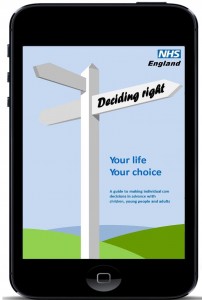Deciding right
A North-East initiative for making care decisions in advance.
Looking for Deciding right resources? All resources can be found here.
All care decisions must come from a shared partnership between the professional and the child, young person or adult. But for those who do not have capacity for their choices, or may lose that capacity in the future it is important that the right choices are made.

Get the App: From the Apple Store and Google Play. Or download an interactive desktop app – click the image above
What is Deciding right?
Deciding right:
- Applies to all ages, care situations and settings
- Emphasises the partnership between the individual, carer or parent and the clinician
- Places the Mental Capacity Act (MCA) at the centre of shared decision-making
- Enables professionals and organisations to comply with the MCA by filling the gap in practice, not just the knowledge gap
- Recognises the individual with capacity as key to making care decisions in advance
- Empowers the individual who lacks capacity to have decisions made in their best interests
- Enables information to be recognisable in all care settings
- Introduces emergency health care plans as an important adjunct in all settings to tailor care to the individual with complex needs
- Ensures that, wherever possible, documentation and information is suitable for all ages (children, young people and adults)
Why Deciding right?
- It is crucial to put the individual at the centre of decision making
- The MCA empowers individuals, partners and relatives and healthcare professionals to ensure decisions are tailored to each individual, regardless of their care setting
- Deciding right enables professionals and organisations to comply with the MCA by filling the gap in practice, not just the knowledge gap
- Compliance with the MCA fulfils the requirement of the law. The CQC are now checking compliance in all visits.
- Deciding right is the opportunity to improve communication and reduce complaints & litigation
Successfully planning care in advance
Requires:
- Putting the individual at the centre of the dialogue
- Good communication skills
- A professional who never assumes what an individual should know or discuss
- Clear documentation of the decision-making
NB. ‘Advance care plans’ have no clinical or legal definition
More information is available, including detailed guidance, in Your life, Your choice.